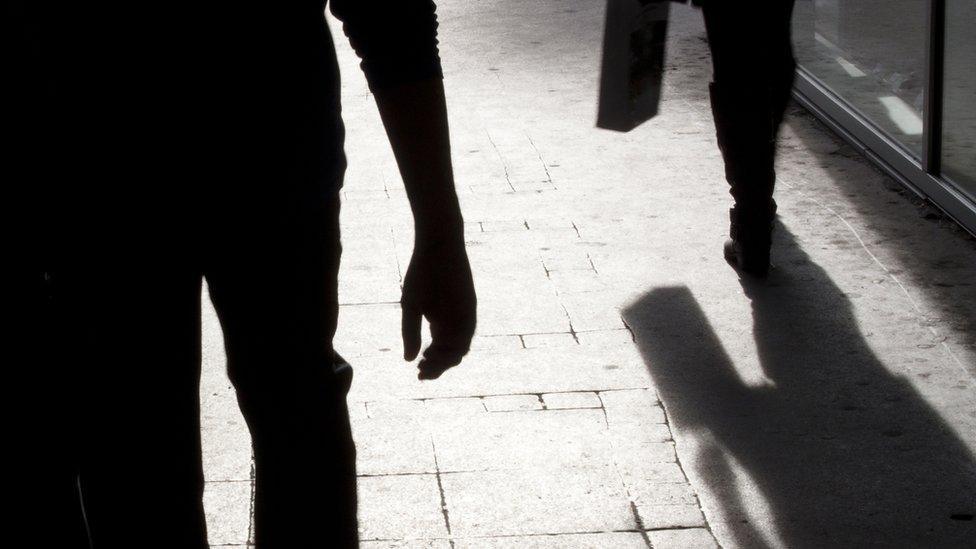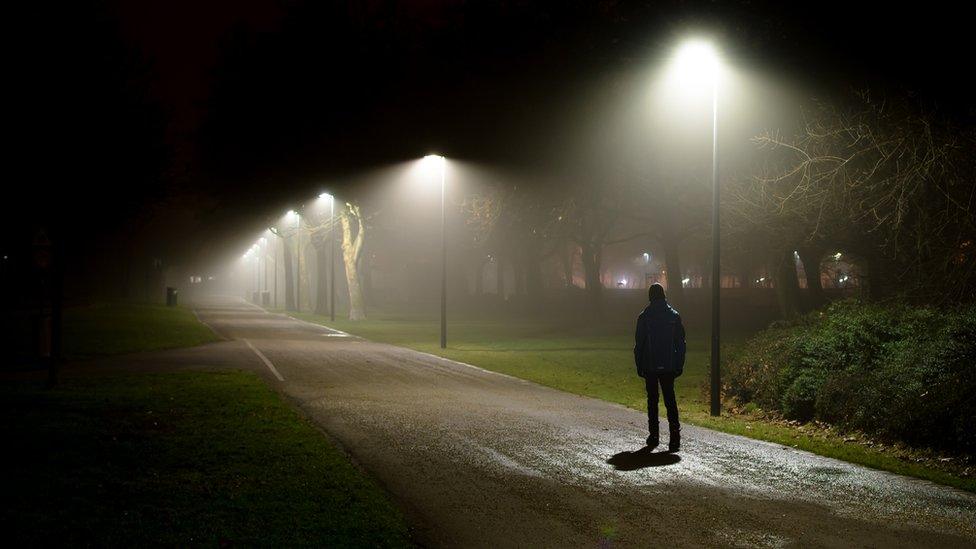Male stalking victim: 'People don’t take you seriously'
- Published

The number of men being targeted by stalkers has been increasing, police figures obtained by the BBC show.
A total of 41 out of 46 UK police forces responded to a Freedom of Information request submitted by 5 live Investigates, which found there were 1,800 stalking crimes against men recorded over four years, between 2014 and 2017.
The BBC FOI request also suggested men were almost as likely to be stalked by other men, as by women. Where forces provided data about the perpetrator, 47% of stalking crimes against men were committed by men.
But the real number affected by stalking is thought to be much higher.
According to the Crime Survey for England and Wales, 1.2 million people were estimated to have been stalked in the year ending March 2016 - 450,000 men and 759,000 women. It is estimated around 85% of victims do not report incidents of stalking.
However, some male victims have told 5 live Investigates they do not feel they have been taken seriously by police.
Bob Coughtrey, a 53-year-old driving instructor from Lancashire, was stalked by one of his pupils.
It started with a text message two days after she passed her test.
"She sent me a message which said 'part of me wishes I hadn't passed my test, because I would have got to spend more time with you'," he recalls.
"I didn't reply, but the texts just kept coming all night. They got darker and darker. I thought she might be at risk so I called the police, who went to her house."
But the bombardment of texts and phone calls carried on every night. Bob never replied. He says she would leave voicemails up to 15 times a night but police told him there was nothing they could do, because she had not made direct contact.

One night, Bob's former pupil turned up at his flat and texted him to say she was outside and wanted to talk to him. She had followed him home.
"I'm a grown man, but I felt very vulnerable and anxious," he says. "The next evening, my doorbell rang repeatedly. I looked out of the window and it was her again. She then phoned me eight times while she was outside. I phoned 999, and within a few minutes a police car arrived and they arrested her on suspicion of harassment."
She was given a suspended prison sentence and a restraining order banning her from going anywhere near his home or making any form of contact with him.
'It's suffocating'
Bob says the ordeal has had a lasting impact.
"It's horrible. It's almost suffocating. It changes your life, how you feel about people. You feel as if you're not quite being taken seriously, because you're a man.
"Some people might think it's harmless - it's just a woman that's just giving you some attention. It's not, because the attention is unwanted, the attention is unsolicited, and it was never reciprocated. I'm very cautious now, always looking around me when I go outside. I don't feel safe."

Suky Bhaker, from the Suzy Lamplugh Trust, says: "What we know from those who contact us at the National Stalking Helpline is that the number of crimes reported may just be a drop in the ocean. We have thousands of calls every year, and around 23% of those are from men."
'I couldn't sleep'
James (not his real name), 44, was harassed by a former neighbour after they had a one-night stand.
Days later the man started bombarding him with threatening texts, calls and social media messages.
"He was saying that he was waiting outside my flat, that if I didn't reply to him he would get angry, vengeful; that I wouldn't like him when he was angry. On one occasion, he was standing outside my flat when I was inside."
James became increasingly worried about his safety: "I couldn't sleep at night, I couldn't work because I hadn't had any sleep. All I could think was one night I'm just going to get out of the car, he's going to be there, and you know, that'll be it."

Eventually the man was convicted of harassment and subjected to an order banning him from contacting James directly or indirectly.
But this did not stop him. Two months later James began getting calls from the man at work. On a night out, he came over to James in a bar. The order he had breached was amended to stop him going within a certain distance of James's home, but he says it's still an ongoing problem.
"I report it to the police every time he breaches the injunction, but I now think that I will be doing it for the rest of my life. I've had to have my phone cut off. I have no visible presence on social media. It's a constant worry, it affects everything, every decision that I make about where I go, what I do. It feels like it is never ever going to end."
Sharon Stratton, from the College of Policing, says: "I understand stalking is under-reported generally, and men report less than women. We must ensure that we encourage people to come forward.
"I know men and women are sometimes concerned that when they do report, they won't be taken seriously. We advise officers to be non-judgemental, regardless of gender, and not make assumptions of anyone."
A Home Office spokesman said the government had strengthened the law introducing new stalking offences and was taking steps to introduce a new civil stalking protection order to protect victims at the earliest possible stage.

5 live Investigates - Male Stalking Victims is broadcast on Sunday 7 January 2018. You can listen again on the iPlayer.
Have you got something you want investigating? We want to hear from you. Email us., external